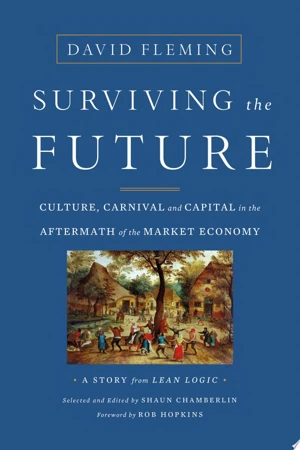Surviving the Future – Culture, Carnival and Capital in the Aftermath of the Market Economy

Blurb
Surviving the Future is a story drawn from the fertile ground of the late David Fleming's extraordinary 'Lean Logic: A Dictionary for the Future and How to Survive It'. That hardback consists of four hundred and four interlinked dictionary entries, inviting readers to choose their own path through its radical vision. Recognizing that Lean Logic's sheer size and unusual structure can be daunting, Fleming's long-time collaborator Shaun Chamberlin has selected and edited one of these potential narratives to create Surviving the Future. The content, rare insights, and uniquely enjoyable writing style remain Fleming's, but are presented here at a more accessible paperback-length and in conventional read-it-front-to-back format. The subtitle "Culture, Carnival and Capital in the Aftermath of the Market Economy" hints at Fleming's vision. He believed that the market economy will not survive its inherent flaws beyond the early decades of this century, and that its failure will bring great challenges, but he did not dwell on this: "We know what we need to do. We need to build the sequel, to draw on inspiration which has lain dormant, like the seed beneath the snow." Surviving the Future lays out a compelling and powerfully different new economics for a post-growth world. One that relies not on taut competitiveness and eternally increasing productivity--"putting the grim into reality"--but on the play, humor, conversation, and reciprocal obligations of a rich culture. Building on a remarkable breadth of intellectual and cultural heritage--from Keynes to Kumar, Homer to Huxley, Mumford to MacIntyre, Scruton to Shiva, Shakespeare to Schumacher--Fleming describes a world in which, as he says, "there will be time for music." This is the world that many of us want to live in, yet we are told it is idealistic and unrealistic. With an evident mastery of both economic theory and historical precedent, Fleming shows that it is not only desirable, but actually the only system with a realistic claim to longevity. With friendliness, humor, and charm, Surviving the Future plucks this vision out of our daydreams and shows us how to make it real.
Book summary
Until his death in 2010 Fleming was one of the pioneers of post-growth economics, crafting the influential vision of what he called Lean Economics. 'Surviving the Future' unique perspective and growing popularity stems from the fact that Fleming believed (even during his lifetime, so some decades ago) that societal collapse was an inevitable and approaching consequence of our economic, scological and cultural mis-steps, and devoted his life to exploring how we might prepare, and what life after collapse looks like. As a cultural historian, he looked in depth at how economies functioned before the brief and ill-fated era of growth-based capitalism, realising that it is *conviviality, carnival and community* that bind people together to thrive in the absence of economic growth or full-time employment. And as an economist, he explored the practicalities of how this functions, leading to his core focus on the central importance of culture, for in his words: "At present, culture is decorative rather than structural; although it may lift the spirits ... The Lean Economy, in contrast, will depend for its existence on a deep foundation in culture. It is possible to live without it, but only for a time, like holding your breath under water." "The difficult task will not be to move away from our market-based civil society: that will fall away so fast that we will find it hard to believe it was ever there. The task, on the contrary, is to recognise that the seeds of a community ethic—and, indeed, of benevolence—still exist. It is to join up the remnants of local culture that survive, and give it the chance to get its confidence back. We now need to move from a precious interest in culture as entertainment, often passive and solitary, to culture in its original, earthy senses of the story and celebration, the guardianship and dance that tell you where you are, and who is there with you... "

